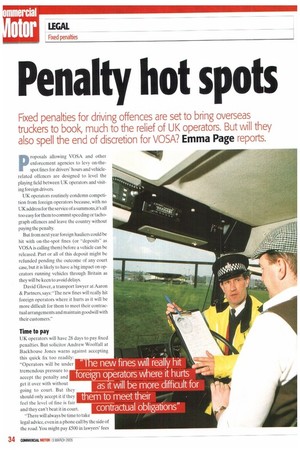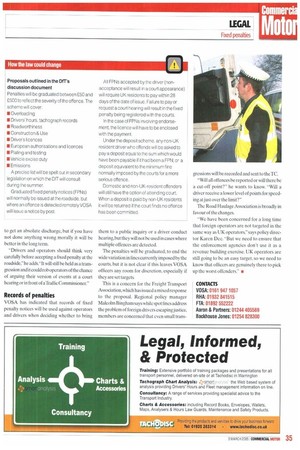Penalty hot spots
Page 34

Page 37

If you've noticed an error in this article please click here to report it so we can fix it.
Fixed penalties for driving offences are set to bring overseas truckers to book, much to the relief of UK operators. But will they also spell the end of discretion for VOSA? Emma Page reports.
proposals allowing VOSA and other enforcement agencies to levy on-thespot fines for drivers' hours and vehiclerelated offences are designed to level the playing field between UK operators and visiting foreign drivers.
UK operators routinely condemn competition from foreign operators because, with no UK address for the service of a summons, it's all too easy for them to commit speeding or tachograph offences and leave the country without paying the penalty.
But from next year foreign hauliers could be hit with on-the-spot fines (or "deposits" as VOSA is calling them) before a vehicle can be released. Part or all of this deposit might be refunded pending the outcome of any court case, but it is likely to have a big impact on operators running vehicles through Britain as they will be keen to avoid delays.
David Glover, a transport lawyer at Aaron & Partners, says: "The new fines will really hit foreign operators where it hurts as it will be more difficult for them to meet their contractual arrangements and maintain goodwill with their customers."
Time to pay
UK operators will have 28 days to pay fixed penalties. But solicitor Andrew Woo!fall at Backhouse Jones warns against accepting this quick fix too readily: "Operators will be under tremendous pressure to accept the penalty and get it over with without going to court. But they should only accept it if they feel the level of fine is fair and they can't beat it in court.
-There will always be time to take legal advice, even in a phone call by the side of the road. You might pay £500 in lawyers' fees to get an absolute discharge, hut if you have not done anything wrong morally it will be better in the long term.
"Drivers and operators should think very carefully before accepting a fixed penalty at the roadside," he adds." It will still be held as a transgression and it could rob operators of the chance of arguing their version of events at a court hearing or in front of a Traffic Commissioner."
Records of penalties
VOSA has indicated that records of fixed penalty notices will be used against operators and drivers when deciding whether to bring them to a public inquiry or a driver conduct hearing, but they will not be used in cases where multiple offences are detected.
The penalties will be graduated, to end the wide variation in Fmes currently imposed by the courts, but it is not clear if this leaves VOSA officers any room for discretion, especially if they are set targets.
This is a concern for the Freight Transport Association, which has issued a mixed response to the proposal. Regional policy manager Malcolm Bingham says while spot lines address the problem of foreign drivers escaping justice, members are concerned that even small trans gressions will be recorded and sent to the TC.
"Will all offences be reported or will there be a cut-off point?" he wants to know. "Will a driver receive a lower level of points for speeding at just over the limit?"
The Road Haulage Association is broadly in favour of the changes.
-We have been concerned for a long time that foreign operators are not targeted in the same way as UK operators," says policy director Karen Dec. "But we need to ensure that the enforcement agencies don't use it as a revenue building exercise. UK operators are still going to be an easy target. so we need to know that officers are genuinely there to pick up the worst offenders." •










































































































































































































